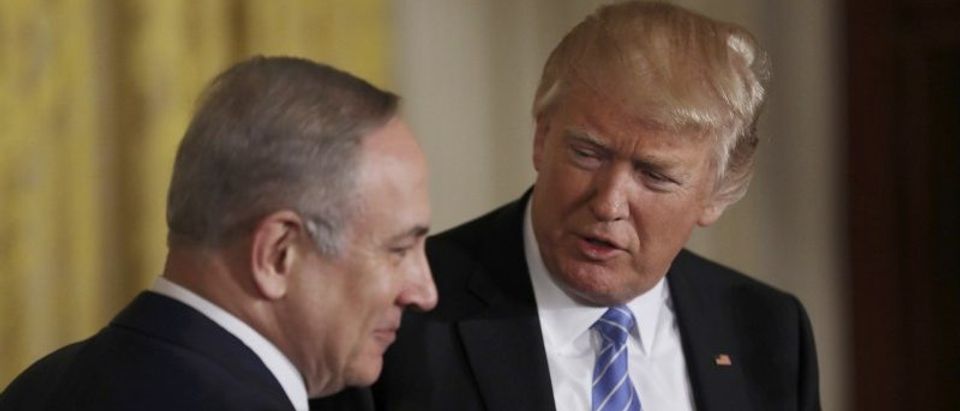The near-Messianic belief in President Trump held by certain pro-Israel Jews dates to the campaign, when he seemed an unshakeable friend to the Jewish state, especially compared to Hillary Clinton. But in just ten days, the president has reversed himself on China, North Korea, Syria, Russia, and NATO. Trump’s dizzying abandonment of once-unshakeable positions raises the question whether Israel will be the next ally he decides to pass over.
In fact, the Trump Administration has already sent mixed signals that should worry hardline Zionists. During the campaign, Trump firmly supported the West Bank settlement project, but two weeks ago he said expanding settlements “does not help advance peace.” His promises to move the Israeli embassy to Jerusalem have been downgraded to getting what Vice President Mike Pence calls “serious consideration.”
The fate of the embassy will soon become clear. If Trump wants to leave it in Tel Aviv, he has until May 1 to sign a “national security” waiver to the 1995 Jerusalem Embassy Act as his predecessors have done twice yearly.
Though the many Orthodox and other conservative pro-Israel supporters of the president expect the embassy to move, they should be cautious. The man whose considerable ego is built on deal-making has called Middle East peace “the ultimate deal” – and that means compromise. In The Art of the Deal, Trump boasted of aiming very high, but “sometimes I settle for less than I sought.” Another of his principles is to “never get too attached to one deal or one approach.”
West Bank settlers and their financial and political backers in the Diaspora see every one of their positions as inalienable. They will inevitably find any Trump-style deal regarding Israel thoroughly dispiriting.
Those confident that Trump’s commitment to right-skewing positions on Israel won’t share the fate of his promises to stay out of Syria and label China a currency manipulator point to his bedrock Evangelical support and the role of Jewish family members Jared Kushner and Ivanka Trump. Neither is a slam dunk.
So far, evangelicals have followed (the steadfastly pro-life) Trump more than the other way around – most prominently on gay rights. The Family Research Council and similar groups muted their disappointment when Trump didn’t issue an anti-gay executive order and reappointed an Obama administration gay-rights diplomat. Evangelical Zionist fervor could similarly wane should the president waver on Israel.
Regarding Kushner and his wife Ivanka, true believers on the right may be overly enamored with their own extremist belief that anyone with a more accommodating position toward Palestinians is necessarily anti-Israel.
Trump’s Jewish daughter and son-in-law have never identified with the most religiously and politically conservative segments of Orthodox Judaism. The rabbi responsible for the very fact they are a Jewish family is famously on the more accommodating side of Orthodoxy, and three years ago, the school associated with their Upper East Side synagogue invited a prominent Muslim critic of Israel to speak. While the invitation was later rescinded, the controversy would be unthinkable at nearly all other Orthodox schools and congregations.
It’s true that Kushner has been close to Israeli Prime Minister Benjamin Netanyahu for many years, but Netanyahu himself is suspect in right-leaning Zionist quarters for his support of a two-state solution and supposed excessive friendliness with Palestinian leaders. As for settlements, The New York Times says Kushner’s thinking “is not well understood.”
We may be facing a “Nixon goes to China” moment for both Kushner and Trump. That expression refers to President Richard Nixon’s 1972 China trip normalizing relations between the United States and the world’s most populous country At the time, Democrats would suffer political disaster for de-escalating tensions with the communist behemoth. But as a Republican with impeccable anti-communist credentials, Nixon was able to take that bold but important step.
The Likudniks who celebrated Kushner’s appointment as Middle East envoy were reading the wrong tea leaves. What use is a negotiator who could never budge? Trump’s thinking may very well be: if even Kushner is willing to pressure Israel to make concessions on settlements, Jerusalem, and Palestinian sovereignty, the administration will appear to be an honest and fair broker.
As a resident of Jerusalem, dual citizen of the United States and Israel, and center-right Zionist, I pray the administration vigorously defends the security of the State of Israel. But recent world events underscore what I told my pro-Israel friends when I told them I was voting for Clinton. Her pro-Israel credentials may have been suspect, but her stability and predictability were better for America – and, ultimately, Israel – than a president whose positions change radically as he learns on the job and discovers that being a president is a lot harder and less fun than being a candidate.
David Benkof is a columnist for The Daily Caller. Follow him on Twitter (@DavidBenkof) and Muckrack.com/DavidBenkof, or E-mail him at DavidBenkof@gmail.com.


